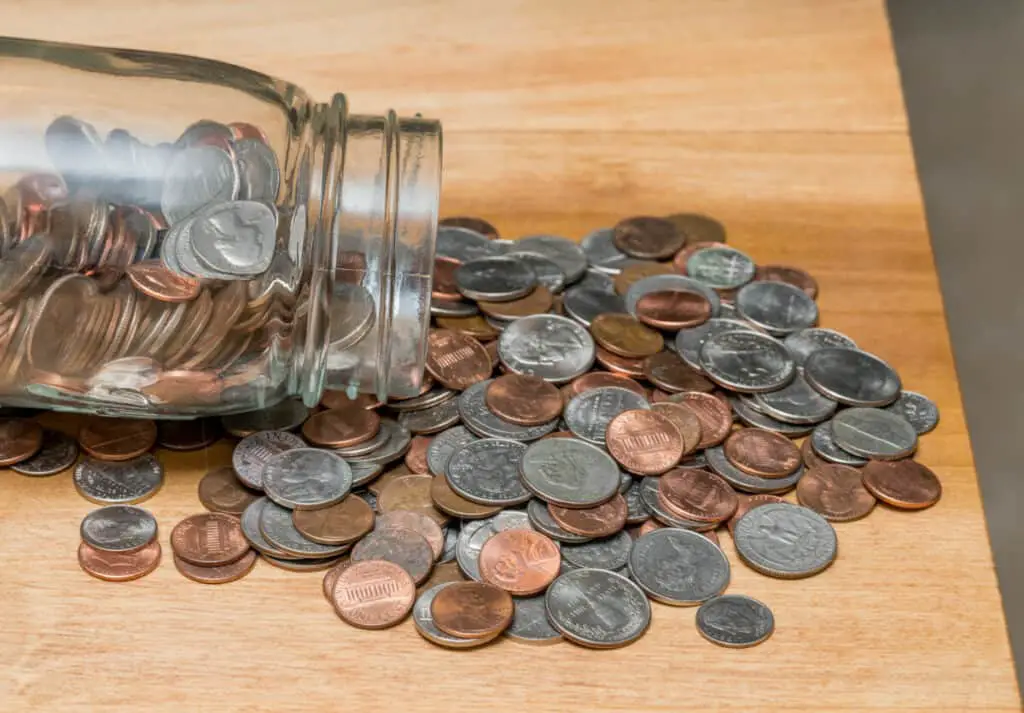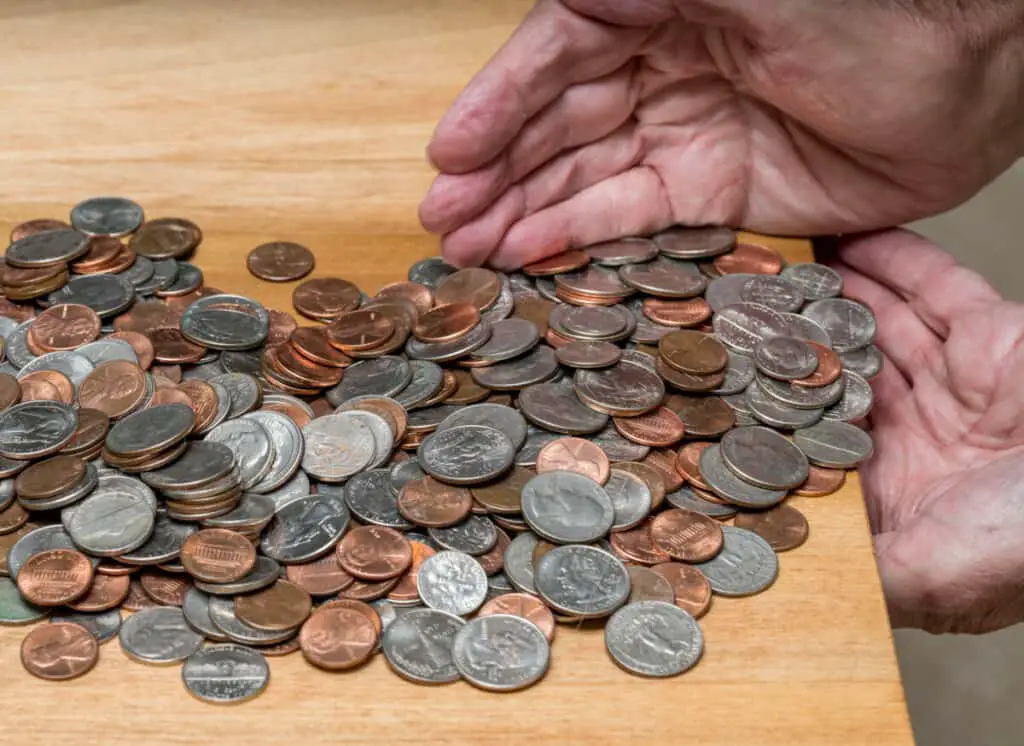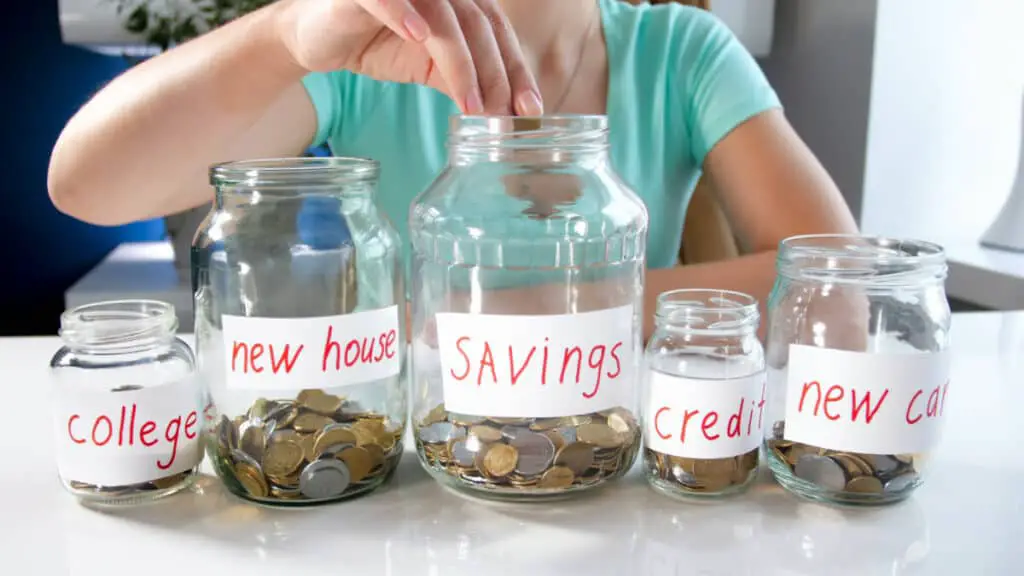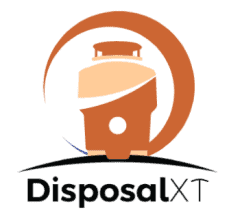
Whether they’re inherited, found in the laundry machine, or dropped into an empty jar, old coins love to pile up. What can be done with all those old coins?
Old coins should be checked for value before anything else is done with them. Valuable coins can be sold. Coins worth the expected amount can be rolled and deposited at any bank, deposited in a coin-counting machine, or stored by individuals for savings. Sorting coins into rolls can make use easier.
The right kind of old coins can be worth a lot of money, but even the more expected kind can add up. Keep reading below to learn what can be done with all that change!
What Should I Do With Old Coins?
We all have loose change scattered around somewhere. Once that jar of pennies goes over 3 lbs, it goes from homey decor to a hassle in the blink of an eye. If you’ve inherited an entire pickle jar of loose change from grandma, you might be feeling completely overwhelmed.
Don’t give up hope yet! That jar of coins could be worth more than enough to make up for the time spent sorting it. One mason jar holds about $13 worth of pennies, the least valuable coin, and your benefits go up from there. Here are some things you can do with those old coins.
Gather Up Your Coins

As long as you’ve finally decided to deal with the coins, you may as well make sure you get all of the coins. This means finding anything under couch cushions, in jacket pockets, at the bottom of backpacks and purses, deep in junk drawers, or anywhere else your coins might hide. Leave no collection spot unsearched.
Some places you might want to check for coins include inside the washing machine, especially under the rubber lip of front-loading machines, and under the seats of your car. Money loves to hide there.
Once you’re done checking, gather everything together in a jar or a bowl on the table. You’re ready to start!
Separate the Extra Valuable From the Typical
If you have any experience identifying valuable coins, this will be easier. If not, you can make a quick pile of “odd” coins as you separate them from the normal ones and check them against Google searches for valuable coins later.
If you already know some of the coins are valuable, like coins collected in a separate box or book, don’t clean them! Save them separately until you can sell them online or to a local collector. Remember that online prices are retail value from mass sellers, not individuals, so you’ll get less money, but it should still be worth more than using the coin at the grocery store.
Turn Small Change Into Functional Money
Once you’re left with a pile of typical old coins, you’re ready to be efficient.
The fastest way to clear out old coins is by pouring them into a coin-counting machine, but that can take a large percentage of the total value. Accepting the money as an Amazon or restaurant gift card will leave you with more of the total money, but limit what you can do with it.
The sure way to very literally get your money’s worth is to get coin sleeves from your bank or a local store. You can turn on a show while you load the coin sleeves, then deposit this organized money directly into your bank account. Most banks will only accept change in this form.
Identifying Valuable Old Coins, And What You Can Do With Them
Identifying valuable old coins isn’t as easy as it seems. Being old doesn’t automatically mean it’s more valuable than a newer coin. However, it can be a helpful hint to look more closely if the coin is old. Here are some examples of valuable coins.
| Coins | Retail Value of the Coin |
| Draped Bust Half Cents | About $300 |
| Indian Head Pennies | From $0.35 to $3,000 |
| Lincoln Wheat Pennies | From $0.04 to $5,400 |
| Mercury Dimes | From $2.25 to $9,000 |
Use caution when having coins evaluated by a dealer, as they will probably offer under what the coin is worth when offering to buy it from you. You can check out online forums to ask about the value of coins, and you might end up enjoying the community so much that coin collecting becomes your new hobby!
What You Can Do With Normal Old Coins

Once you’ve cleared out all the extra-valuable coins, you still have a lot of potential money sitting in front of you. All those pennies, nickels, and dimes in your change jar can add up to more than you would expect. Some people have hundreds of dollars in change sitting unused in their homes! Make sure you don’t lose an opportunity to add to your bank account.
Coin Counting Machines
Coin counting machines have their pros and cons. The biggest “pro” is that they are simple to use and very convenient since you just pour in the change and accept the money. However, the “con” is that the machine can keep a large portion of that money if you don’t accept the amount as a gift card instead of cash.
For some people, the trade-off of convenience for cost is worth it. For others, a gift card is a great use of their spare change. If you need the money for something other than Amazon or Chili’s, try rolling coins for the bank instead.
Rolling Coins For the Bank
If you’ve ever worked with a cash register, you probably know what a roll of coins looks like. Those bundles of coins are an easy, consistent, and trusted method of counting your money before depositing it at the bank. You can pick up the paper wrappers at many dollar stores, drug stores, or at the bank you use.
If you’re not a customer of that bank, they will sometimes charge a fee to cash out those rolls of coins. The simple solution to this is to use your own bank, but overall, you’re probably going to get more value with a small fee than you would with a jar of 12,345 pennies.
Using Savings Jars
If you’re not quite ready to deposit your change, no worries! Try setting up a few change jars and label them as “Savings”. You’ll be more motivated to make sure old coins make it into a jar if you know it’s for the house ice cream fund. Have some fun, get creative, and use those old coins.
Related Topics:
If you like the article above, here are some other similar articles you should check out!
What Should I Do with Old Cassette Tapes
